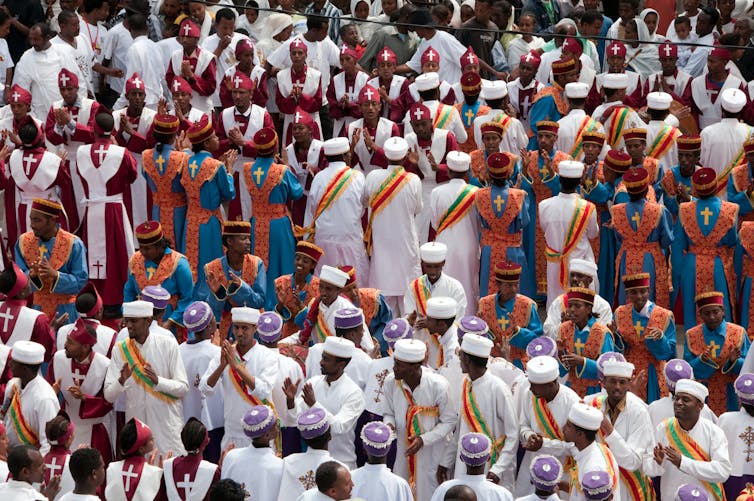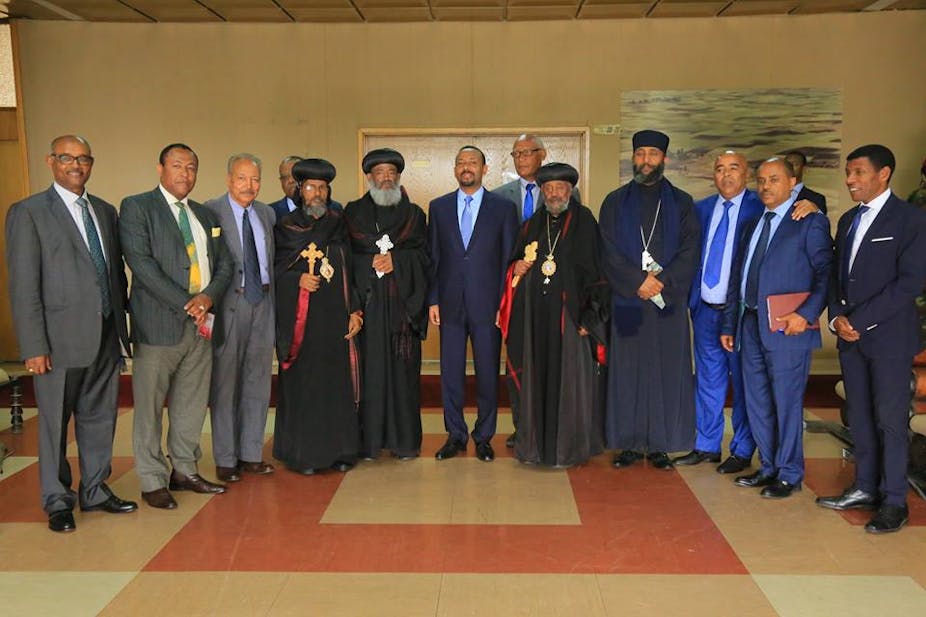Ethiopia, once again, is at a crossroads. The last four months have seen jubilation and euphoria over the change and reform that the new Prime Minister Abiy Ahmed was promising to bring. The nation is now waking up to harsher realities. Internal displacement, unlawful killings, tribal conflicts and mob justice are becoming routine experiences.
Abiy’s administration is either showing signs of complacency or is incapable of ensuring the safety of its citizens. As a result, his project of national reconciliation faces an increasing threat. The sporadic unrest also means that there is a need for deeper grassroots engagement in this area of reconciliation and peaceful coexistence.
The church is an obvious source because Ethiopia is an overwhelmingly religious nation. About 99% of the population says religion is the most important aspect of their life. More than 40% of Ethiopia’s population of about 100 million belongs to the Ethiopian Orthodox Tewahido Church (EOTC), which has a version of Christianity that emerged in the fourth century. The other 60% is divided between other Christian denominations and Islam.
Politics and religion are closely linked in Ethiopia. Abiy is clearly fully aware of this and appears to be employing it in his efforts to reconcile the country’s people. His most significant achievement, perhaps next to ending hostility with Eritrea, is reuniting the EOTC.
The recent return to Ethiopia of the 4th Patriarch of the Ethiopian Orthodox Tewahido Church after 27 years in exile is a prime example. Abune Merkorios fled to the US after he was forced to abdicate in 1991 as head of the church. Nearly three decades later, as part of his campaign of reconciliation, Abiy met Merkorios in the US and persuaded the Abune (head of the church) to return to his motherland with the aim of reuniting with another faction of the powerful church. On 1 August 2018 Merkorios arrived home in the capital, Addis Ababa.
Merkorios is seen by many as representing the ecclesiastical opposition in exile. He will now be responsible for the spiritual aspects of the church, while incumbent Abune Mathias will run the church’s day-to-day affairs. The reunification has helped the church to get its house in order.
Abiy’s decision to reach out to Merkorios is making perfect political sense with regards to enhancing his project of reconciliation.
Political purposes
The division in the church back in the 1990s was engineered to serve political purposes. Merkorios, the rightful successor of Abune Teklehaimanot (in 1988) was forced to abdicate by the then new regime, the Ethiopian People’s Revolutionary Democratic Front, after defeating the notorious Dergue – a Marxist regime lead by Mengistu Hailemariam. Abune Paulos, coming from the same Tigray ethnic group as the late Prime Minister Meles Zenawi, was appointed a new head of the church. This injected tribalism in the church. The move was seen by many as a way of keeping this powerful church on a short leash so it would not be a threat to the establishment.

The church has always mirrored Ethiopian society, including its ills and hopes. Its unification brought hope to the whole nation. This was reflected in the welcoming ceremony of the Abune Merkorios. Lining up to welcome him at the Bole International Airport were not only Orthodox Christians, but also Protestant and Muslim leaders. This shows the magnitude of the impact the church could have if it is able to get its house in order.
The Ethiopian Orthodox Tewahido Church is more than just a church. It is a source of philosophy and indigenous innovation such as unique architecture, music and literature. For most of its history, it’s coexisted peacefully with the state, with only occasional tension.
Abiy understands the importance of its role in Ethiopian society. Although he has a Protestant background, he has made it clear that the country needs strong religious institutions – both Islamic and Christian. He has invited them to hold him accountable when he crosses the line, and to make their own contribution in combating corruption and promoting peaceful coexistence.
Reinventing the Covenant
As I have pointed out elsewhere, Ethiopia is a storytelling nation. The Orthodox Church has played a very important role not only in inventing the Ethiopian story, but also interpreting it.
The notion of “Ethiopia as a covenant nation” was invented by ecclesiastical and political elites. It was meant to glue an ethnically and religiously plural nation together. However, over time, this has become too militant and triumphalist precisely because the unification process was coercive rather than invitational.
But under Abiy it has came to life again. This is primarily due to his rallying cry of “medemer”, an invitation to all Ethiopians to join hands in mending the country’s violent and fractious differences.
Abiy’s under-explored, but promising, social philosophy can give the Orthodox Church an ample chance to revisit its own political theology. But the Orthodox Church should consider the diversity (of both ideology and ethnicity) within its ranks. The church is not as monolithic as it used to be.
This consideration should also be made based on a careful reading of the political environment, because what happens in the church would inevitably permeate people’s outlook beyond the church.
As Abiy rightly pointed out, Ethiopia needs stronger religious institutions. Fractured institutions breed divisions, while unified and solid institutions are easy to mobilise for peace and reconciliation.






